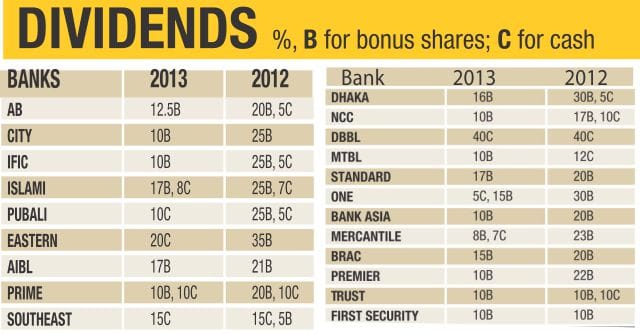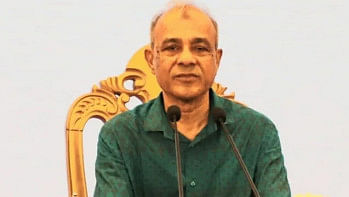Provisioning forces banks to lower dividends
Banks have mostly been announcing lower dividends this year, due to a big drop in profits.
Of the 30 listed banks, 21 have so far declared their dividends for 2012 -- and 19 of them were lower than a year ago.
The other two banks extended the same dividends as the previous year's, according to data from Dhaka Stock Exchange.
In 2012, banks' net profits plummeted 104 percent, propelled by an unprecedented rise in default loans -- which required greater provisioning.
The banks made a total operating profit of Tk 19,727 crore, and after deducting for provisions and taxes, the figure stood at Tk 4,465 crore.
Provision, essentially, is an expense for banks to account for future losses on loan defaults.
Last year, loan defaults shot up dramatically, driven by a series of scams.
Ali Reza Iftekhar, managing director of Eastern Bank, said the sector's non-performing loan (NPL) ratio increased from 7.5 percent to more than 10 percent, in 2012.
“This, coupled with the bearish trend of the stock market, has forced the banks to provision a huge amount, which has reduced the bank's capacity to give higher dividends.”
The stockmarket has been subjected to a bear run since the crash early 2011. The DGEN, a key index of the Dhaka Stock Exchange, plunged to around 4,500 points at the end of 2012 from 9,304 on January 1, 2011.
K Mahmood Sattar, managing director of The City Bank, also identified the large amount of provisioning due to NPL as the main reason behind the lower dividends this year.“The business was not bad, so the operating profit was not bad, either. Some even recorded higher operating profits in 2012 than a year ago. But the large provisioning has eaten up all the operating profits.”
Moreover, the strict provisioning requirements set by the central bank, Sattar says, have bloated the provisioning figures.


 For all latest news, follow The Daily Star's Google News channel.
For all latest news, follow The Daily Star's Google News channel. 



Comments